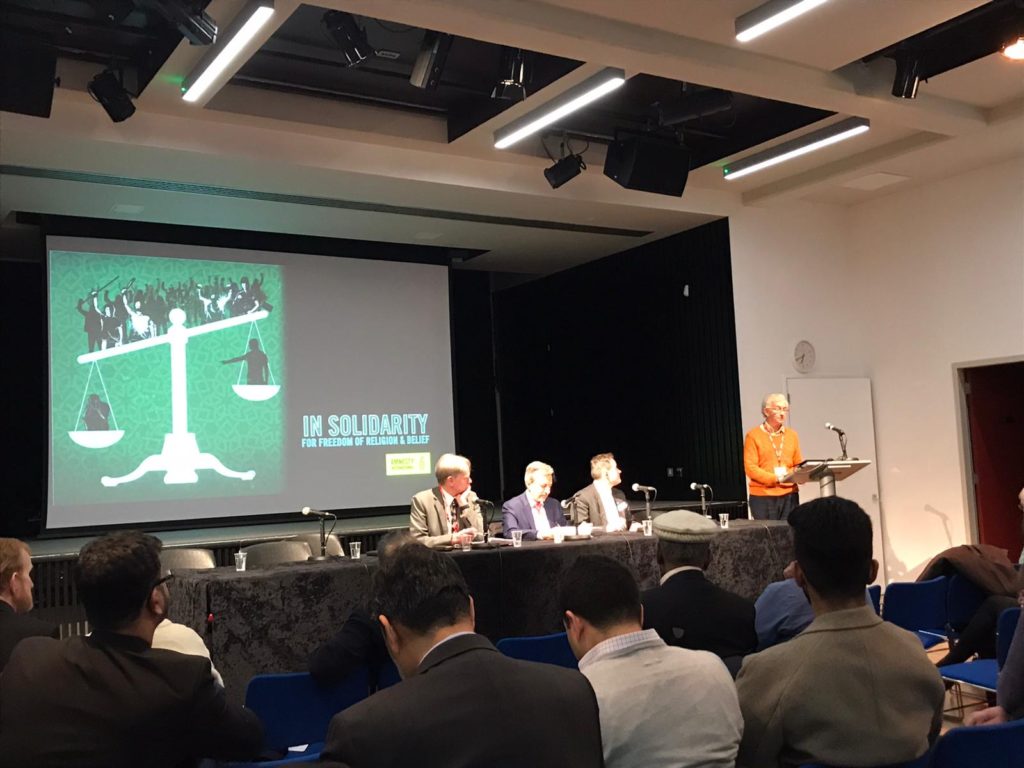Fareed Ahmad, National Secretary External Affairs, Jamaat UK

On 27 January 2020, in partnership with Amnesty International, Jamaat-e-Ahmadiyya UK, through the national external affairs department co-hosted a conference to raise awareness of the persecution of religious minorities in Pakistan – particularly the Ahmadi Muslims.
The conference – held at Amnesty’s UK headquarters – focused on the impact of the blasphemy laws on perpetuating an environment of hate and extremism. This was the first conference of its kind to have been hosted by Amnesty International.
Around 70 individuals attended the event, which included former journalists and researchers, as well as many Jamaat members.
Jerry Allen, Amnesty International’s Country Coordinator for South Asia, welcomed attendees to the conference and noted that this conference followed a resolution passed at its previous AGM. He spoke of the need to develop practical steps to help improve the situation in Pakistan.
Peter Murray, Amnesty International’s Country Coordinator for Pakistan, gave an overview of the laws of the country and how they are being used to target different minorities in Pakistan.
Fareed Ahmad, National Secretary Umur-e-Kharijah focused on how persecution impacts Ahmadi Muslim from the cradle to the grave. He also emphasised that we were not against Pakistan, but wanted to see laws reformed so that all citizens have freedom of religion, as this would engender social peace and deliver prosperity for the country. He also raised the issue of voting rights, the publications ban and the need to remove hate from the education system. He then highlighted the cases of three Ahmadis on death row.
Omar Warraich, Amnesty International’s Deputy South Asia Director, spoke about the retaliation of authorities against religious communities and minorities. He also noted that the current government had only acted when the army shows an interest. He noted the case of Atif Mian and said that Ahmadis faced extremely difficult times and there was little sign of change from the government at present, despite warm words.
Siobhain McDonagh MP, Chair of the APPG for the Ahmadiyya Muslim Community, gave an account of the APPG’s work and key findings from its inquiry into the persecution of Ahmadi Muslims and other minorities. She also called for greater action by the Charity Commission in the UK to tackle imported extremists who are operating as registered charities and promised to raise this through the APPG.
Siobhain also spoke of the need for the UK government to have more resources to stop preachers of hate coming to the UK and for UK aid money to be monitored carefully to ensure it is not being misused in Pakistan to promote hate.
Siobhain went on to say that she would continue to press the UK Government to do more to urge Pakistan on the issue of persecution of Ahmadis. She also said how it was worrying to note that in Pakistan the youth are perhaps more radicalised (due to madrasas) rather than being more liberal and tolerant.
Siobhain praised the work of the Jamaat in the UK and globally.
John Pontifex, Aid to the Church in Need’s Head of Press and Information, gave an account of the persecution faced by Christians in Pakistan. He acknowledged that Ahmadis faced more severe persecution and also spoke on how the FIR system and judicial process needs to change to distance it from mob pressure.
Fiyaz Mughal OBE, Director of Faith Matters, gave a powerful account of the likely rise in extremism if UK authorities fail to address anti-Ahmadi Muslim hate. He called for the UK government to be more willing to recognise hate and if someone supported or travelled to a funeral of people like Mumtaz Qadri then they must be held to account as that is the same as glorification of extremism.
Mr Mughal noted how hate is impacting Ahmadis – even in the public sphere and noted the work he has done with us to produce a report (being published this year) on this. He added that some mainstream Muslims hold deep prejudice against Ahmadis and this is completely unacceptable and the UK Government must be alert to this and not use such people for their faith engagement or public policy work.
Attendees had the opportunity to ask questions and suggest ideas for future steps to ensure Amnesty’s sustained support for the rights of Ahmadi Muslims.

